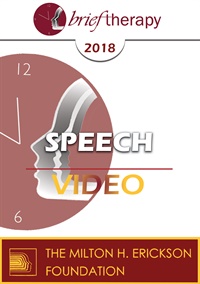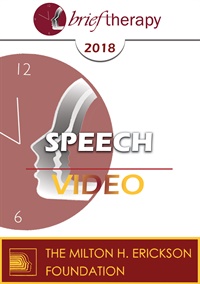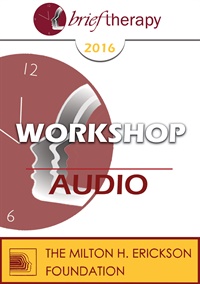
- Average Rating:
- Not yet rated
- Topic Areas:
- Psychotherapy | Workshops | Generative Psychotherapy
- Categories:
- Brief Therapy Conference | Brief Therapy Conference 2016
- Faculty:
- Stephen Gilligan, PhD
- Duration:
- 2:37:44
- Format:
- Audio Only
- Original Program Date:
- Dec 09, 2016
- Short Description:
- Generative psychotherapy is an exploration of how individuals can forge positive, therapeutic responses to life challenges. This invited address concentrates on the three core connections that allow clients to do this: (1) Positive intention and goals (What do you most want to create in your life?); (2) Somatic Centering (Where do you feel the deepest resonance in your body?); and (3) Field Resources (What can most deeply support your path of change?).
- Price:
- $15.00 - Base Price
Credit available - Click Here for more information
- Average Rating:
- Not yet rated
- Topic Areas:
- Speeches | Children and Adolescent Therapy | Art and Creativity | Brief Therapy | Family Therapy | Anxiety | Depression | Goals of the Therapist
- Categories:
- Brief Therapy Conference | Brief Therapy Conference 2018 | Online Continuing Education
- Faculty:
- Lynn Lyons, LICSW
- Course Levels:
- Master Degree or Higher in Health-Related Field
- Duration:
- 1:02:45
- Format:
- Audio and Video
- Original Program Date:
- Dec 09, 2018
- Short Description:
- We don't often think of creativity and problem solving as equal partners in therapy with children. But when struggling families arrive at your office, it is the immediate blending of these two components that allows you and the family to move quickly from overwhelmed to engaged, confused to targeted. Based on 29 years of successes and failures, this speech will offer ideas to immediately connect with families, help them untangle the tired messiness they often arrive with, and create active interventions that build momentum, create new patterns, and offer hope.
- Price:
-
Sale is $29.00
price reduced from Base Price - $59.00
Credit available - Click Here for more information
- Average Rating:
- Not yet rated
- Topic Areas:
- Speeches | Psychotherapy | Art and Creativity | Brief Therapy | Resources
- Categories:
- Brief Therapy Conference | Brief Therapy Conference 2018 | Online Continuing Education
- Faculty:
- Stephen Gilligan, PhD
- Course Levels:
- Master Degree or Higher in Health-Related Field
- Duration:
- 1:01:12
- Format:
- Audio and Video
- Original Program Date:
- Dec 09, 2018
- Short Description:
- Therapy is successful when clients are able to experience significantly changed realities. While the identification and transformation of symptoms is important in this regard, the activation of the client's creative capacity to make positive changes is even more important. This paper will explore how the 6-step model of Generative Psychotherapy provides a disciplined yet flexible process for helping clients claim and use their agency for creative change.
- Price:
-
Sale is $29.00
price reduced from Base Price - $59.00
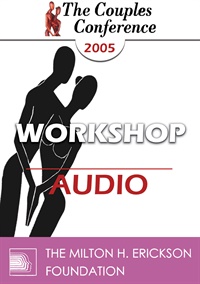
- Average Rating:
- Not yet rated
- Topic Areas:
- Workshops | Couples Therapy | Metaphors | Art and Creativity
- Categories:
- Couples Conference | Couples Conference 2005
- Faculty:
- Peggy Papp, ACSW
- Duration:
- 1:52:55
- Format:
- Audio Only
- Original Program Date:
- Mar 05, 2005
- Short Description:
- CC05 Workshop 12 - Developing Creative Solutions - Peggy Papp, ACSW
- Price:
- $15.00 - Base Price
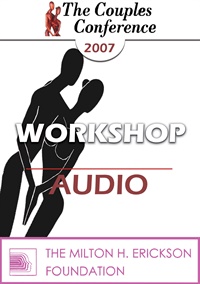
- Average Rating:
- Not yet rated
- Topic Areas:
- Workshops | Confrontation | Couples Therapy
- Categories:
- Couples Conference | Couples Conference 2007
- Faculty:
- Ellyn Bader, PhD
- Duration:
- 1:48:02
- Format:
- Audio Only
- Original Program Date:
- Apr 27, 2007
- Short Description:
- While confrontation is often the best way to help clients examine their contribution to a problem, many therapists feels anxious about the tension aroused during confrontation. Leam to employ confrontation in couples work with special emphasis on matching the intensity of the confrontation- gentle to tough- with the level of impasse. The focus will be on how to select what to confront, when to confront, and how to build a confrontation over time. You will leave this session with a firmer grasp of the attitude and posture necessary to use confrontation more effectively in your work.
- Price:
- $15.00 - Base Price
Tags: Confrontation Couples Therapy
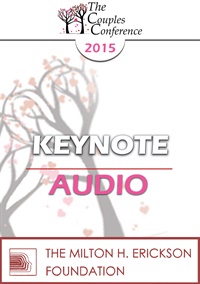
- Average Rating:
- Not yet rated
- Topic Areas:
- Couples Therapy | Keynotes | Trauma
- Categories:
- Couples Conference | Couples Conference 2015
- Faculty:
- Bill O'Hanlon, MS
- Duration:
- 55:33
- Format:
- Audio Only
- Original Program Date:
- Apr 25, 2015
- Short Description:
- Rituals have been used for thousands of years to help people move through difficult developmental times, to move on from problems and stuck places and to grieve and leave trauma behind. In this session, you will discover the two types of rituals that can help couples resolve their issues effectively.
- Price:
- $15.00 - Base Price
Tags: Couples Therapy Trauma
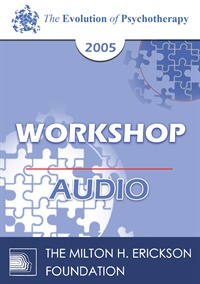
EP05 Workshop 23 - The Creative Reconstruction of Mind, Memory and Consciousness - Ernest Rossi, PhD
- Average Rating:
- Not yet rated
- Topic Areas:
- Workshops | Consciousness | Memory | Four-Stage Creative Process | Genomics | Hypnosis | Neuroscience | Psychotherapy
- Categories:
- Evolution of Psychotherapy | Evolution of Psychotherapy 2005
- Faculty:
- Ernest Rossi, PhD
- Duration:
- 2 Hours 36 Minutes
- Format:
- Audio Only
- Original Program Date:
- Dec 08, 2005
- Short Description:
- Lecture, group and individual demonstrations with volunteers from the audience will illustrate Rossi's activity-dependent approaches to therapeutic hypnosis and psychotherapy that are consistent with the theory and research on the molecular-genomic level plasticity for the creative reconstruction of mind, memory and consciousness.
- Price:
- $15.00 - Base Price

- Average Rating:
- Not yet rated
- Topic Areas:
- Psychotherapy | Dialogues | Art and Creativity
- Categories:
- Evolution of Psychotherapy | Evolution of Psychotherapy 2013
- Faculty:
- Robert Dilts, BA | Ernest Rossi, PhD
- Duration:
- 1 Hour 1 Minutes
- Format:
- Audio Only
- Original Program Date:
- Dec 13, 2013
- Short Description:
- EP13 Dialogue 06 – Creativity – Robert Dilts and Ernest Rossi, PhD Moderator: Richard Landis, PhD Educational Objectives: Given a topic, describe the differing approaches to psychotherapy, and identify the strengths and weaknesses of each approach.
- Price:
- $15.00 - Base Price
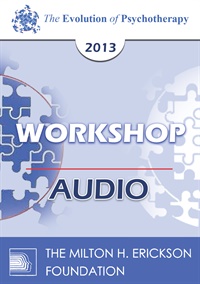
- Average Rating:
- Not yet rated
- Topic Areas:
- Workshops | Unconscious Processes | Art and Creativity | Consciousness | Four-Stage Creative Process | Psychotherapy
- Categories:
- Evolution of Psychotherapy | Evolution of Psychotherapy 2013
- Faculty:
- Ernest Rossi, PhD | Kathryn Rossi, PhD | Bruce Gregory, PhD | Birgitta Gregory, PhD
- Duration:
- 2 Hours 32 Minutes
- Format:
- Audio Only
- Original Program Date:
- Dec 11, 2013
- Short Description:
- What is Life? What is Consciousness? Theory, research and practice of Psychosocial Genomics are outlined as the next step in the Evolution of Psychotherapy. A live group demonstration of how to facilitate gene expression and brain plasticity by optimizing the 4-stage creative process for 20 minutes will be experienced by everyone.
- Price:
- $15.00 - Base Price
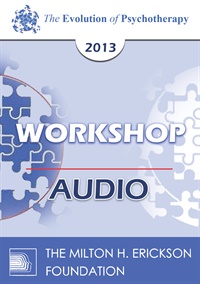
EP13 Workshop 25 – The Three Positive Connections Needed for Creative Change – Stephen Gilligan, PhD
- Average Rating:
- Not yet rated
- Topic Areas:
- Workshops | Goals of the Therapist | Psychotherapy | Resources | Somatic Experiences
- Categories:
- Evolution of Psychotherapy | Evolution of Psychotherapy 2013
- Faculty:
- Stephen Gilligan, PhD
- Duration:
- 2 Hours 39 Minutes
- Format:
- Audio Only
- Original Program Date:
- Dec 12, 2013
- Short Description:
- Psychotherapy is an exploration of how individuals can forge positive, therapeutic responses to life challenges. This workshop focuses on the three core connections that allow clients to do this: (1) Positive intention and goals (“towards a positive future”); (2) Somatic Centering (“embodied presence”); and (3) Field Resources (“positive connections beyond the problem”). We will see how in a repetitive problem, all three of these connections are typically absent. More importantly, we will see how clients may be helped to developed and sustain these positive connections while engaging with challenging material—e.g., a past trauma, a present difficulty, or a future possibility. Participants will be offered multiple techniques and examples, as well as several demonstrations to illustrate this positive orientation to psychotherapy.
- Price:
- $15.00 - Base Price
Please wait ...


